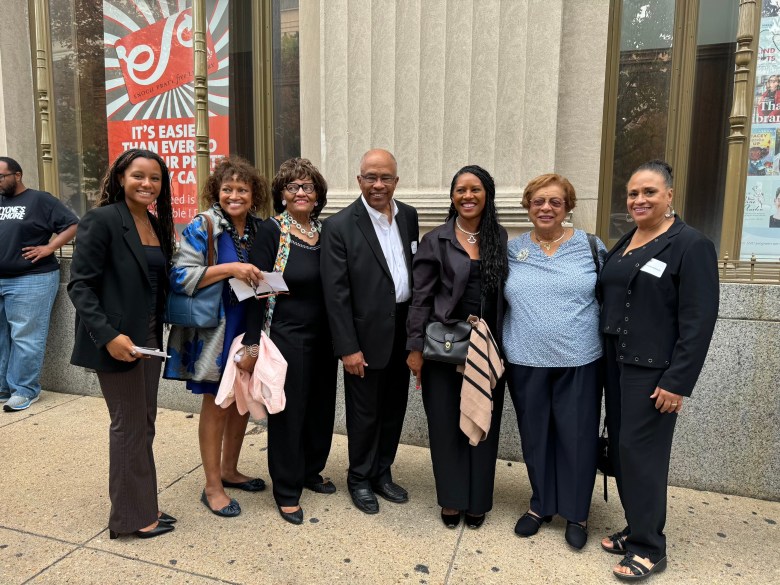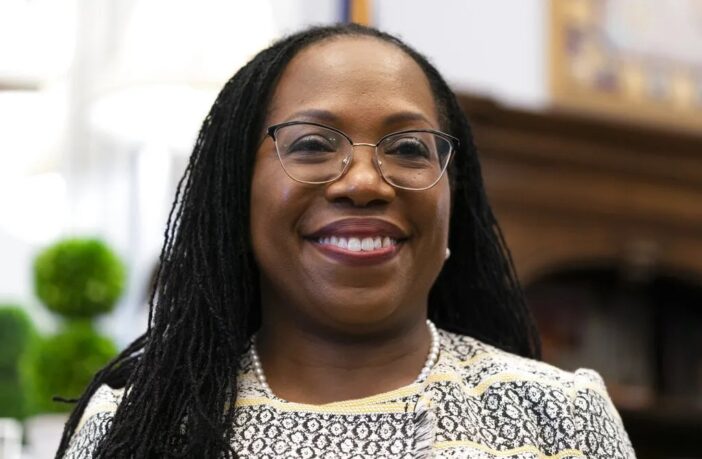U.S. Supreme Court Justice Ketanji Brown Jackson is speaking to audiences across the nation with her new book, “Lovely One.” The Baltimore stop of the book tour took place on Sept. 21 at the Central Branch of Enoch Pratt Free Library. (AP Photo)
By AFRO Staff
U.S. Supreme Court Justice Ketanji Brown Jackson spoke in Baltimore about her new book, “Lovely One,” inside of the Enoch Pratt Free Library’s Central Branch on Sept. 21.
Those able to secure one of the hottest tickets in town on Saturday night were able to hear the first Black woman to sit on the U.S. Supreme Court speak about not only her new book, but her own personal origin story and the people who put her on the path to success in the law field.
“My father went back to law school when I was three years old. We lived on the campus of the University of Miami Law School,” said Justice Jackson. “My earliest memories are of my dad’s education table with his law books.”
The title of her book, “Lovely One,” is a nod to the name given to her at birth by an aunt who worked in West Africa, “Ketanji Onyika,” which means “lovely one” in English.
Jackson noted that while the book is about her life, history and the impact of crucial moments in America are also woven through the pages.
“I start the book with my grandparents and then my parents. I’m trying to emphasize the great good fortune of my birth –the timing of my birth,” said Jackson. “I am a member of the first generation post-Civil Rights Era. And the significance of that I just don’t want anyone to miss. I was born in 1970, which was within five or six years of the Civil Rights Act, the Voting rights Act, and the end of civil pro-segregation.”
Jackson said that while her parents were born during a time of segregation, her birth came during a “new opening of society to African Americans,” and filled them with hope.
“They were like, ‘here’s our shot,’” said Jackson, of her parent’s determination to have their daughter take advantage of every opportunity they themselves were denied.
“If there were swimming lessons, I was in the swimming lessons. If there were music lessons, I was doing the music lessons,” said Jackson. “When I was five-years-old, 6-years-old, my mother had me memorizing poems…I wrote the book as sort of a tribute to the people and circumstances that I felt were most responsible for my being in a position to take advantage of this.”
 Among the hundreds of people waiting outside of the Pratt Library yesterday were (l to r): Madelynn Huff, sophomore Yale University; Alice Pinderhughes, attorney; Brenda Reed, of Fort Washington, Md.; Honorable Kurt Schmoke, president of University of Baltimore; LaVonda Reed, dean of University of Baltimore, School of Law; Dr. Maggie Caples, of Cockeysville, Md., and Dr. Patricia Schmoke; an ophthalmologist in Baltimore City. (AFRO Photo)
Among the hundreds of people waiting outside of the Pratt Library yesterday were (l to r): Madelynn Huff, sophomore Yale University; Alice Pinderhughes, attorney; Brenda Reed, of Fort Washington, Md.; Honorable Kurt Schmoke, president of University of Baltimore; LaVonda Reed, dean of University of Baltimore, School of Law; Dr. Maggie Caples, of Cockeysville, Md., and Dr. Patricia Schmoke; an ophthalmologist in Baltimore City. (AFRO Photo)
U.S. Supreme Court Justice Ketanji Onyika Brown born to two public school teachers, Johnny and Ellery Brown, in Washington, D.C. on Sept. 14, 1970. After the pair moved to Miami, Jackson’s father eventually became a Miami-Dade school board attorney, while her mother worked her way to become a school principal.
It was in Miami that Jackson’s start began to shine. She was elected class president while attending Miami Palmetto Senior High School and by 1988 she was studying at Harvard University. There, she crossed paths with another Harvard student, Patrick Jackson. After graduating from Harvard in 1992, the future judge went on to Harvard Law School and both graduated and married in 1996.
After completing clerkships for three different judges, including U.S. Supreme Court Justice Stephen Breyer, Jackson worked with private law firms and in government for a number of years. In 2012, after working with the U.S. Sentencing Commission and serving as a prosecutor, Jackson was selected by then President Barack Obamato serve on the federal District Court of Washington, D.C. His nomination didn’t receive a vote, so he nominated Jackson again the next year. In 2013 she was successfully confirmed. Years later, in April 2021, President Joe Biden asked that Jackson be appointed to the Court of Appeals for the District of Columbia Circuit. In a 53 to 44 vote, she was confirmed into the role on June 14, 2021, paving the way for her name to be put forth when an opening came up on the Supreme Court the very next year.
The mother of two spoke on the changes she experienced as she ascended through the ranks and took on different types of judgeships.
“I was a trial judge for the longest period of time in my career. I was seven and a half– eight years– in a courtroom where I controlled everything. I was one judge,” she told the packed room of attendees. “Appellate decision making is very challenging when you have to actually work with other judges, like voting on the outcomes.”
During the Charm City leg of her book tour, Justice Jackson spoke about the moment her journey from law student to clerk to judge and finally, a member of the U.S. Supreme Court was fully realized.
“I think the moment that hit me– the first moment–was the day I was confirmed. I actually went to the White House for the vote call, and it was really overwhelming to watch the votes come in,” said Jackson, of that historic April day in 2022.
Jackson said that her book highlights core values taught to her and passed down to her daughter.
“On the day of my divestiture as a district court judge, my first judicial appointment, I gave a speech in my daughter’s middle school: ‘Work hard, be kind, have faith, and believe that anything is possible,’” Jackson told the audience. “I think those values – you’ll see from my story of the book– are things that I try to live by.”
This article has been adjusted to reflect the correct title of Justice Ketanji Brown Jackson’s book, “Lovely One.”


